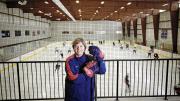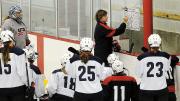The Harvard pipeline to the Winter Olympics this February goes straight through Bedford, Massachusetts. That’s where the U.S. women’s national hockey team set up its training facility: 25 athletes, including five who have played at Harvard, took up residence there in September to train at Edge Sports Center in preparation for the Sochi Games. The Harvard candidates are Julie Chu ’06, Michelle Picard ’15, Josephine Pucci ’13 , Kate Buesser ’11, and Lyndsey Fry ’14; the mentor in charge of shaping these athletes into the 21 players of the Olympic squad (to be announced January 1) is Landry Family head coach for women’s ice hockey Katey Stone. Though she has been in charge at Harvard for 19 years and has won more games than any other coach in the history of Division I women’s hockey, she calls this moment “the pinnacle” of her career.
Since 1994, the nerve center of Harvard’s women’s hockey program has been a windowless cubby of an office tucked under the stands at the Bright-Landry Hockey Center. When Stone arrived as the sport’s fourth coach, she renovated an old corner locker room, bringing in a comfortable couch and chair covered in crimson-and-white check, and scattering table lamps around to give the room a homey feel. “Her office was just awesome,’’ says Union College coach Claudia Asano Barcomb ’99, a former Harvard captain and assistant coach, “because it’s on the way to the locker room and it was always warm and welcoming. The door was always open.’’
Stone was a coaching staff of one when she began her Harvard career. She recruited players first at the hockey-rich prep schools, where she had built a network during prior coaching stints at Tabor, Northfield Mount Hermon, and Exeter, as well as during her own stellar lacrosse and hockey career at the University of New Hampshire. From the start, she looked for more than talent. “Within the Harvard [admissions] standards, which have increased every single year I’ve been [here],’’ she says, “I went after character: kids who were willing to work their tails off, with no guarantee of what that actually meant, to be a part of something that was special. With a locker room filled with great character and energy—to me, the sky’s the limit.’’
In Stone’s first season, the nascent Crimson surprised Northeastern, the era’s dominant team, by winning the Beanpot. There followed three lean, learning years. Then came 1998-99, a magical 33-1 run to a national championship, and Harvard hasn’t had a losing season since. Soon enough, word-of-mouth became Stone’s top recruiter.
Her remarkable 402-171-35 record includes nine NCAA tournament appearances with three consecutive trips to the championship game (2003, 2004, 2005), six ECAC regular-season titles, five ECAC tournament championships, nine Ivy League titles, and 10 Beanpots. She has coached nine Olympians, six Kazmaier Award winners, and 21 All-Americans. (Taking over behind the bench at Harvard this year, while Stone is on leave, is interim head coach Maura Crowell, assistant coach for the Crimson for the last three years.)
The 47-year-old Stone is the first woman to coach the women’s Olympic team. “It was an easy decision,’’ reports Reagan Carey, director of women’s hockey for USA Hockey. Stone, she says, was chosen not because she is a woman, but strictly on the basis of her accomplishments: “She’s right for the job.’’
Stone was born into a family of coaches; her father was the longtime football and baseball coach and athletic director at Taft School in Watertown, Connecticut, and her three older siblings are all coaches, too. The Stones lived on campus, an endless playing field for Katey, who ran from one sport to the next as fast as she could. “She was just a fireball,’’ says her older sister.
“She’s strong; she has confidence in what needs to be done as head coach,’’ says Carey. “And she’s competitive, whether it’s on the ice getting the team together or off the ice in a friendly game of whatever.’’ “Whatever” includes the word game Taboo: Lauren McAuliffe ’04 remembers an endless round played at the back of the team bus because Stone refused to quit until her team was winning. The teams Stone put together for bowling competitions always won, too.
Harvard women’s basketball coach Kathy Delaney-Smith, a friend and tennis partner, respects the composure Stone maintains while competing so intensely. “Katey is one of those athletes who can play any sport,’’ she says. “Golf is really her first love, but she’s a great tennis player. When we compete, it might bother her a bit if I win because I’m almost 20 years older, but she keeps it very balanced and very in perspective.’’
“She’s a demanding coach, and I say that in the best way,’’ says three-time Olympian Julie Chu. “She sets really high standards and expectations for the players and makes sure that every day, we’re trying to live up to those standards. The reason our teams have been so successful and continue to be successful at Harvard is because she really pushes and gets the most out of her players and really cares not only about the on-ice portion, but also about how she develops us as people off the ice.’’
The United States won the inaugural women’s hockey Olympic gold medal in 1998, but Canada has claimed the last three. For the Americans, leaving Sochi with anything but gold will be a colossal letdown. Yet Stone says, “I firmly understand we could do everything right and win, and we could do everything right and maybe not. But that’s the chance you have to take.’’
Her cozy office at Harvard is gone now, swept away in building renovations, but Stone will be back. “We have a goal—a gold medal,’’ she says, “but we don’t have a personal agenda in this. I’m going to go back to Harvard and be just as happy as I was before I left. We’re here because we want this to be the best experience these women have ever had in their lives and, hopefully, we’ll help them get what they want.’’










